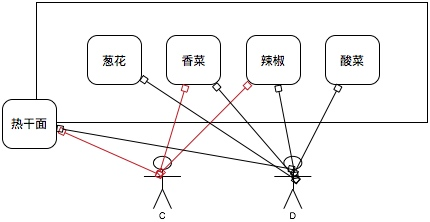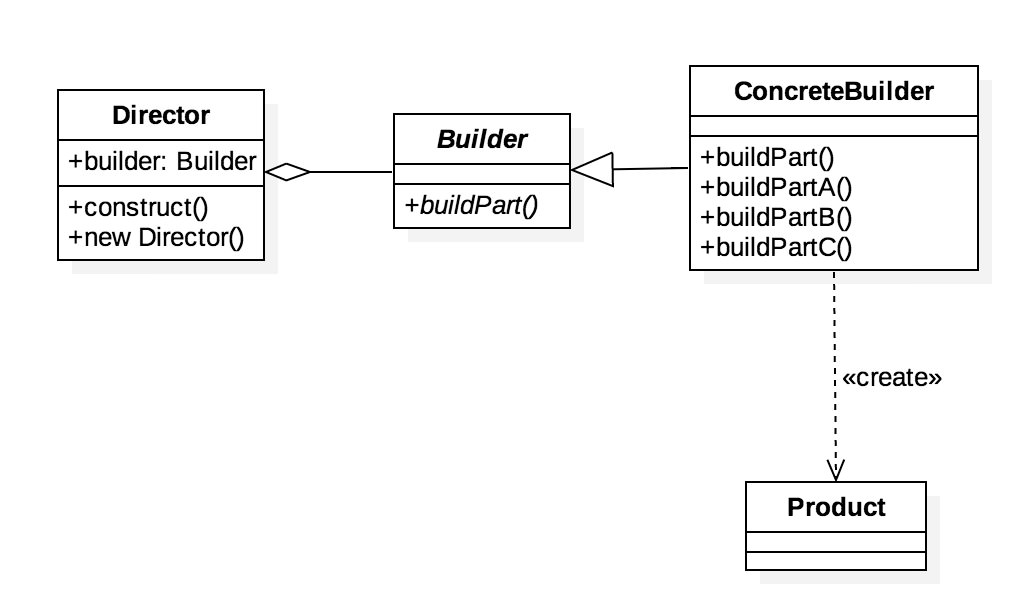看个故事
互联网寒冬来袭, 小光越来越觉得码农这个行当不太好混了. 年关将至, 思乡之情也是倍切. 心底一横, 要不直接回老家做点小买卖得了~
说做就做, 小光辞了工作, 回到老家武汉, 做起了卖热干面的行当.
小光秉着科学开店, 合理经营的心思, 走访老店, 探索人流, 最终把店开在了软件园旁边.
经过仔细他发现, 每个人点热干面时, 要的配料还各不相同, 有的要葱花, 有的不要葱花要香菜, 有的不要辣, 有的要加酸菜......
小光心想, 这可难不倒我, 你要什么不要什么一次性告诉我, 不就得了. 很快, 热干面程序出炉:
public class HotDryNoodles {
private boolean addShallot;
private boolean addParsley;
private boolean addChili;
private boolean addSauerkraut;
public HotDryNoodles(boolean shallot, boolean parsley, boolean chili, boolean sauerkraut) {
this.addShallot = shallot;
this.addParsley = parsley;
this.addChili = chili;
this.addSauerkraut = sauerkraut;
}
@Override
public String toString() {
StringBuilder builder = new StringBuilder("A bowl of hot-dry noodles has:");
if (this.addShallot) {
builder.append("葱花.");
}
if (this.addParsley) {
builder.append("香菜.");
}
if (this.addChili) {
builder.append("辣椒.");
}
if (this.addSauerkraut) {
builder.append("酸菜.");
}
return builder.toString();
}
}注意: 构造函数的参数是有顺序的(葱花.香菜.辣椒.酸菜).
你还别说, 大武汉的码农们还真挺爱吃热干面, 一会生意就上门了:
A: 老板, 热干面一份, 加葱, 加香菜, 放点酸菜.
B: 老板, 热干面, 加葱, 放点酸菜.
小光, 一声"好嘞", 立马开工:
public class XiaoGuang {
public static void main(String[] args) {
// A
HotDryNoodles noodlesA = new HotDryNoodles(true, true, false, true);
System.out.println("Customer A wants: " + noodlesA);
// B
HotDryNoodles noodlesB = new HotDryNoodles(true, false, false, true);
System.out.println("Customer B wants: " + noodlesB);
}
}很快出炉:
Customer A wants: A bowl of hot-dry noodles has:葱花.香菜.酸菜.
Customer B wants: A bowl of hot-dry noodles has:葱花.酸菜.完美~
这时, 来了一哥们儿: 老板, 一碗热干面, 加辣椒, 不放葱.
小光吭哧吭哧忙活上了, 结果一端出来, 人哥们儿不乐意了, 怎么就放葱了啊, 还没有放辣椒~~
原来是小光搞错了顺序(参数顺序)~ (也怪这哥们不按套路出牌啊)
没有办法, 重做一份咯~ (为了用户体验)
收摊之后, 小光是痛定思痛啊, 现在的工序的确很容易出问题啊:
- 目前的(参数)顺序是固定的, 客户要求各异, 根本不按套路来, 就很容易出错.
- 目前的(参数)个数是固定的, 大多数客户都选择默认, 只额外提一两个要求.
小光思考着怎么改进, 突然灵光一现:
这个不就是构建对象时有大量可选参数的问题吗?
我可以使用Builder模式来解决这个问题啊. 原来编程无处不在, 小光暗思.
然后就开始动手改造工序了:
- 他买了张桌子, 用来作为配料台(Builder)
- 把配料(葱花.香菜.辣椒.酸菜)从他的热干面(HotDryNoodlesWithBuilder)构造中移到配料台放着了.
- 让客户自己选择添加什么配料, 自己从配料台上选择添加.
那么, 添加配料的过程编程自取了:

如此一来, 他不仅仅释放了自己的劳动力, 也不用费力去记客户到底要哪些不要哪些的, 把基本的面做好, 放在调料台, 让用户自己添加吧~~
改造后的热干面工序:
public class HotDryNoodlesWithBuilder {
private boolean addShallot;
private boolean addParsley;
private boolean addChili;
private boolean addSauerkraut;
public HotDryNoodlesWithBuilder(Builder builder) {
this.addShallot = builder.addShallot;
this.addParsley = builder.addParsley;
this.addChili = builder.addChili;
this.addSauerkraut = builder.addSauerkraut;
}
@Override
public String toString() {
StringBuilder builder = new StringBuilder("A bowl of hot-dry noodles has:");
if (this.addShallot) {
builder.append("葱花.");
}
if (this.addParsley) {
builder.append("香菜.");
}
if (this.addChili) {
builder.append("辣椒.");
}
if (this.addSauerkraut) {
builder.append("酸菜.");
}
return builder.toString();
}
public static class Builder {
private boolean addShallot;
private boolean addParsley;
private boolean addChili;
private boolean addSauerkraut;
public Builder() {
}
public Builder withShallot() {
this.addShallot = true;
return this;
}
public Builder withParsley() {
this.addParsley = true;
return this;
}
public Builder withChili() {
this.addChili = true;
return this;
}
public Builder withSauerkraut() {
this.addSauerkraut = true;
return this;
}
public HotDryNoodlesWithBuilder build() {
return new HotDryNoodlesWithBuilder(this);
}
}
}来看看用户怎么用的:
public class XiaoGuang {
public static void main(String[] args) {
// with builder
HotDryNoodlesWithBuilder noodlesC = new HotDryNoodlesWithBuilder.Builder()
.withChili()
.withParsley()
.build();
System.out.println("Customer C wants: " + noodlesC);
HotDryNoodlesWithBuilder noodlesD = new HotDryNoodlesWithBuilder.Builder()
.withChili()
.withParsley()
.withSauerkraut()
.withShallot()
.build();
System.out.println("Customer D wants: " + noodlesD);
}
}结果不能太满意:
Customer C wants: A bowl of hot-dry noodles has:香菜.辣椒.
Customer D wants: A bowl of hot-dry noodles has:葱花.香菜.辣椒.酸菜.再也没有用户抱怨说小光搞错了, 想要什么自己加, 顺序也无所谓了. 小光也有更多的时间服务更多的客户了...
看着来来往往的吃客, 小光憧憬着: 眼看就可以开分店, 连锁店, 上市, 当董事长, 迎娶白富美, 走上人生巅峰了, 哈哈哈哈哈.
故事之后
让我们重温下GoF设计模式中的Builder模式:

Buidler模式, 是一种创建型的设计模式.
通常用来将一个复杂的对象的构造过程分离, 让使用者可以根据需要选择创建过程.
另外, 当这个复杂的对象的构造包含很多可选参数时, 那Builder模式可以说是不二之选了.
从这个故事中, 我们可以看到, 当热干面的配料参数太多时, 我们很难去控制, 一旦弄错了参数顺序, 客户就无法接受~
再来看下本故事中改造后的工序对应Builder模式的关系:

一般来说, Builder常常作为实际产品的静态内部类来实现(提高内聚性).
故而Product,Director, Builder常常是在一个类文件中, 例如本例中的HotDryNoodlesWithBuilder.java.
这里为了更好的对应Builder模式的类图关系, 将HotDryNoodlesWithBuilder画了两个~.
扩展阅读
作为Java/Android开发者, 如果你想设计一个通用的库, Builder模式几乎肯定是会用到的, 我们需要提供良好的入口/接口来使用者可以弹性地构造他们需要的对象.
像一些优秀的开源库, 例如Glide, OkHttp等都在构造Glide, OkHttpClient时用到Builder模式, 例如OkHttpClient的创建, 如下节选OkHttpClient.java的代码:
public class OkHttpClient implements Cloneable, Call.Factory {
public OkHttpClient() {
this(new Builder());
}
private OkHttpClient(Builder builder) {
this.dispatcher = builder.dispatcher;
this.proxy = builder.proxy;
this.protocols = builder.protocols;
this.connectionSpecs = builder.connectionSpecs;
this.interceptors = Util.immutableList(builder.interceptors);
this.networkInterceptors = Util.immutableList(builder.networkInterceptors);
this.proxySelector = builder.proxySelector;
this.cookieJar = builder.cookieJar;
this.cache = builder.cache;
this.internalCache = builder.internalCache;
this.socketFactory = builder.socketFactory;
// more code...
}
public static final class Builder {
public Builder() {
...
}
public Builder cache(Cache cache) {
...
}
public Builder dispatcher(Dispatcher dispatcher) {
...
}
public Builder protocols(List protocols) {
...
}
public List networkInterceptors() {
...
}
public Builder addNetworkInterceptor(Interceptor interceptor) {
...
}
public OkHttpClient build() {
return new OkHttpClient(this);
}
}
}是不是和小光设计的HotDryNoodlesWithBuilder很像...
生活还将继续, 小光继续奋斗着, 憧憬自己的人生巅峰梦~